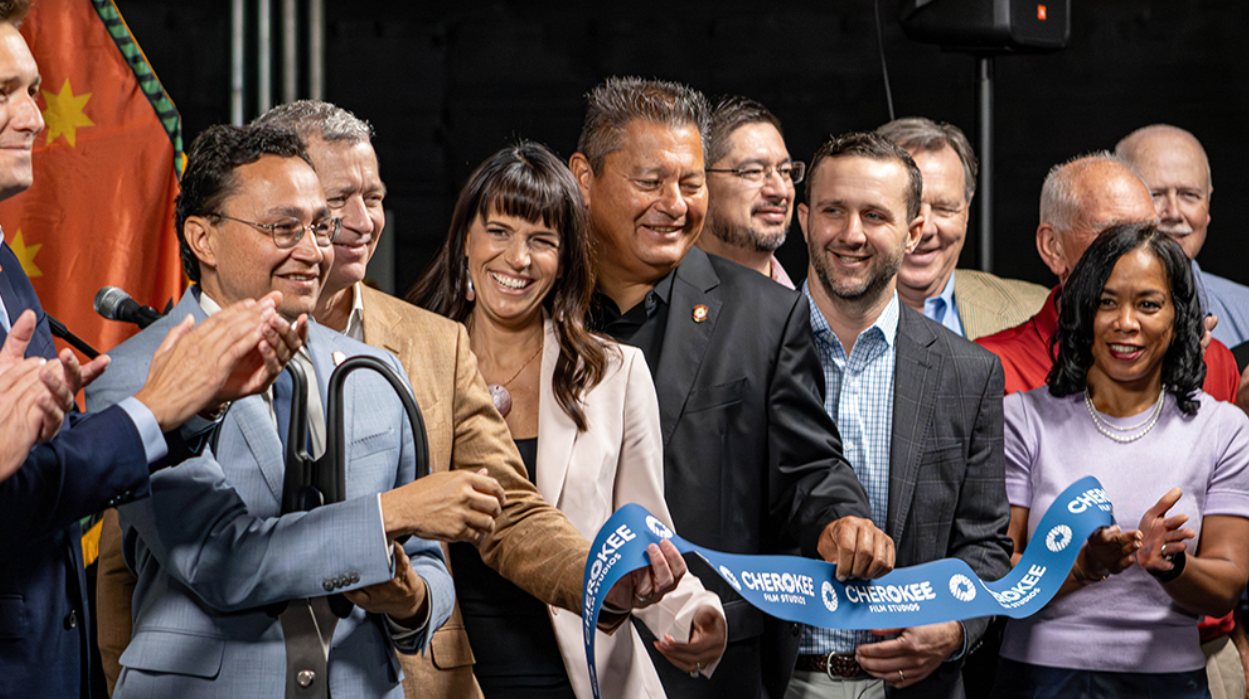
- Details
- By Cherokee Phoenix
Cherokee Nation officials were joined by Oklahoma Lt. Governor Matt Pinnell to cut the ribbon for the expansion of the Cherokee Film Studios in Owosso, Okla.
The studio is the first of its king in Indian Country and in the state of Oklahoma. It includes a state-of-the-art xR, or extended reality, virtual production LED volume studio crafted with industry-leading software and hardware technologies.
“Through our tribe’s breakthrough endeavors, Cherokee Nation remains at the forefront of the emerging film and TV industry in Indian Country,” said Cherokee Nation Principal Chief Chuck Hoskin Jr. “The present and future of Cherokee Nation, our neighboring tribes and Oklahoma are intrinsically intertwined, and this newly expanded campus demonstrates yet another example of our commitment to investing in that future. As we increase infrastructure, explore incentives, connect resources and remove barriers, we are helping grow and amplify television and film production in Oklahoma — the home state of 39 tribal nations — while making it possible for our citizens to be a part of it.”
The recently completed expansion includes a second soundstage featuring 10,000 square feet, a 35-foot ceiling, full soundproofing to cinema standards, a modular truss system with chain hoists, a hair and makeup room, a multipurpose/flex space, restrooms, 14-foot bay doors for load-ins, and RV hookups for production trailers. Additional changes to the Owasso film campus include classroom space for the Cherokee Film Institute, a new lobby and waiting area for clients, a construction mill space equipped with a cyclonic air filtration system, production offices and conference rooms, wardrobe and storage spaces, an audio recording suite, a catering kitchen, and an additional greenroom.
"We are thrilled to welcome Cherokee Film's expansion and new soundstage to northeast Oklahoma," said Lt. Governor Matt Pinnell. "With the opening of this 10,000-square-foot facility, Cherokee Film now has nearly 20,000 square feet of dedicated, state-of-the-art production space, all located less than 20 minutes from the Tulsa International Airport. This is a major investment in diversifying Oklahoma's economy, and the jobs and economic impact we will see will benefit our state for many years to come."
Located within the Cherokee Nation Reservation, the tribal film campus already featured 14,000 square feet of dedicated virtual production and practical studio space with accompanying edit suites, a control room, a pro-grade audio booth, crew and client lounges, as well as hair and makeup facilities to meet the growing needs of production in Oklahoma.
Cherokee Film aims to become a global production hub at the center of the film, TV and entertainment industry that champions diversity and inclusion for underrepresented voices.
“In pursuit of our longtime mission of growing the tribe’s economy, Cherokee Nation Businesses invests in new and diverse opportunities across the globe,” said Chuck Garrett, CEO of Cherokee Nation Businesses. “We continually expand opportunities and advantages throughout northeast Oklahoma by supporting education, growing industries, providing jobs, improving health care, building infrastructure and more. As our businesses continue to grow and succeed, so does our ability to further support the tribe and remain a positive community partner for our state. The rapid and continued growth of Cherokee Film illustrates our continued dedication to creating new jobs, helping develop local economies and continuing to diversify our businesses.”
Cherokee Film Studios is part of the Cherokee Film ecosystem, based in the Cherokee Nation Reservation in Oklahoma. Cherokee Film includes four distinct branches — Cherokee Film Productions, Cherokee Film Studios, Cherokee Film Commission and Cherokee Film Institute — all working toward a shared goal of innovating narrative sovereignty while creating economic development within the tribe’s reservation.
Cherokee Film is owned by Cherokee Nation Businesses, the economic engine of the largest Native American tribe in the U.S. The tribally owned holding company remains a driver of community development, economic impact and cultural preservation, as well as a staple in the hospitality industry and leader in federal contracting solutions.
Help us defend tribal sovereignty.
At Native News Online, our mission is rooted in telling the stories that strengthen sovereignty and uplift Indigenous voices — not just at year’s end, but every single day.
Because of your generosity last year, we were able to keep our reporters on the ground in tribal communities, at national gatherings and in the halls of Congress — covering the issues that matter most to Indian Country: sovereignty, culture, education, health and economic opportunity.
That support sustained us through a tough year in 2025. Now, as we look to the year ahead, we need your help right now to ensure warrior journalism remains strong — reporting that defends tribal sovereignty, amplifies Native truth, and holds power accountable.
 The stakes couldn't be higher. Your support keeps Native voices heard, Native stories told and Native sovereignty defended.
The stakes couldn't be higher. Your support keeps Native voices heard, Native stories told and Native sovereignty defended.
Stand with Warrior Journalism today.
Levi Rickert (Potawatomi), Editor & Publisher

